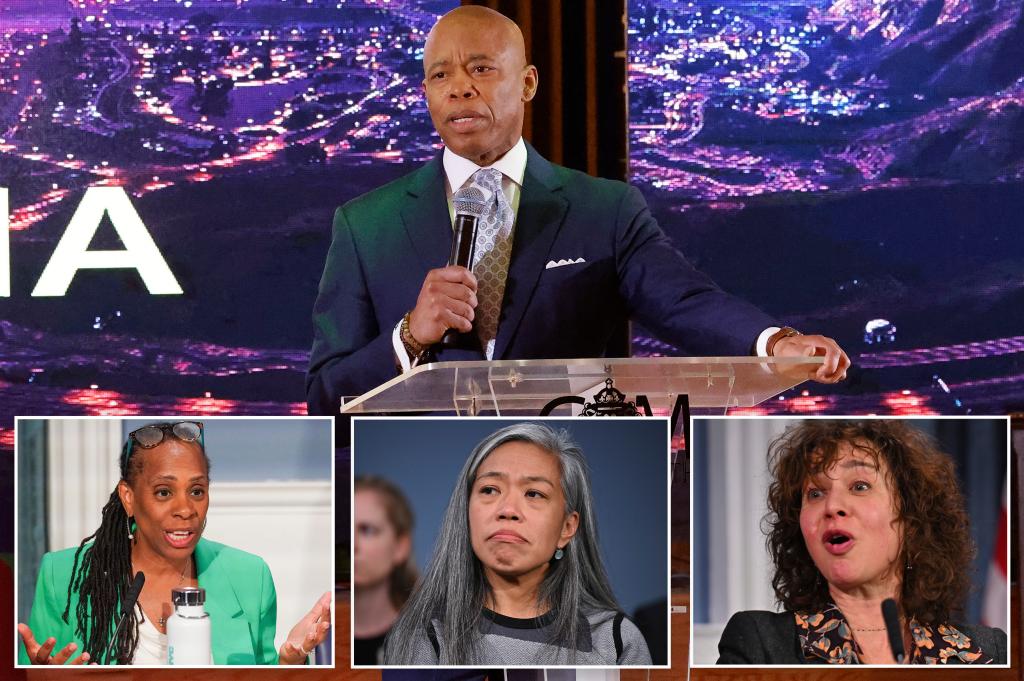Summarize this content to 2000 words in 6 paragraphs
Half of New York City’s deputy mayors dramatically resigned Monday in the wake of Eric Adams’ controversial reprieve from his historic corruption case by President Trump’s Justice Department.
The resignations of Adams’ four senior aides — led by First Deputy Mayor Maria Torres-Springer — thrusts City Hall even deeper into uncharted territory as the mayor faces mounting questions about whether he can govern the city.
The four deputy mayors — Torres-Springer, Deputy Mayor for Operations Meera Joshi, Deputy Mayor for Health Human Services Anne Williams-Isom and Deputy Mayor for Public Safety Chauncey Parker — resigned as a rally in support of Adams unfolded in Rehoboth Cathedral in Brooklyn.
The rally contrasted with the growing calls for Gov. Kathy Hochul to remove Adams from office in light of Trump’s DOJ moving to scuttle his criminal case — a move that many critics argue makes the mayor a hostage to the president.
“I am disappointed to see them go, but given the current challenges, I understand their decision and wish them nothing but success in the future,” Adams said in a statement.
At least three of those senior aides had signaled their intent to depart Adams’ troubled administration over the weekend, prompting a desperate Zoom meeting in which the increasingly isolated mayor tried to convince them to stay, or at least delay their exits.
At least one other deputy mayors — Fabien Levy, the chief mouthpiece for Adams — is also unhappy and eyeing an exit, multiple sources have told The Post.
But the furor — and questions whether Adams is beholden to Trump, rather than New York City voters — apparently was too much for the three seasoned public servants.
The exit of Torres-Springer in particular could be a bad sign for Adams.
Torres-Springer, a veteran of the administrations of mayors Bill de Blasio and Michael Bloomberg, had been elevated to the first deputy mayor position in October as Hochul pressured Adams to clean house in the wake of his federal indictment and a raft of federal raids targeting his inner circle.
Hochul, at that time, had faced pressure to use her executive power to suspend or boot Adams from office.
Adams’ appointment of Torres-Springer was part of a set of moves that cooled the clamor and reinjected stability into City Hall.
Likewise, Joshi and Williams-Isom were seen as competent bureaucrats who could help steer the city’s government through rocky political terrain.
Joshi had formerly led the Taxi and Limousine Commission, among other high-profile roles, before overseeing the city’s infrastructure under Adams.
Williams-Isom, under Adams, had the thankless task of managing the city’s response to the migrant crisis and homelessness.
And Parker, who worked four decades in law enforcement, took over the deputy mayor for public safety role from Phil Banks, a longtime crony of Adams who repeatedly faced corruption accusations.
Many insiders viewed Parker as a welcome “boring” pick compared to the brash Banks.
Together, the departing deputy mayors had helped keep Adams’ administration afloat as the mayor fought his corruption case — and evidently cozied up enough to Trump and the president’s circle that they viewed the prosecution as an impediment.
Acting Deputy Attorney General Emil Bove ordered Manhattan federal prosecutors to drop the case against Adams in part because he argued that it impacted Adams’ ability to help with Trump’s immigration crackdown.
The order prompted Acting Manhattan US Attorney Danielle Sassoon to dramatically refuse to obey the demand.
Sassoon instead sent a scathing resignation letter accusing Adams of agreeing to acquiesce to Trump’s immigration plans as part of a “quid pro quo” deal to get his case dropped. She also revealed that the feds were poised to bring a new indictment against Adams, this time accusing of him destroying evidence and telling people to lie to the FBI.
The quid pro quo accusation — which Bove and Adams’ attorney Alex Spiro denied — poured fuel on already heated accusations that the mayor effectively put himself in Trump’s pocket.
Hagan Scotten — an assistant US attorney and the lead prosecutor on the case — in his own resignation letter wrote that only a “fool” or “coward” would comply with the DOJ order, which keeps Hizzoner beholden to President Trump because of the possibility of reviving the case after November’s mayoral election.
“Any assistant US attorney would know that our laws and traditions do not allow using the prosecutorial power to influence other citizens, much less elected officials, in this way,” Scotten fumed.


